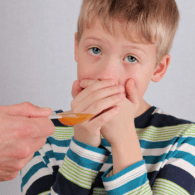A Recent Study of Nearly 500 Adults
A July 2017 study looked at the dosing errors adults make when they are providing the medication to a child. Using a randomized study of nearly 500 adults, three different interventions of dosing medicines for children were tested. The three interventions that were used for the study were common ways which parents measure dosages for children:
- Pictograms
- Written instructions with units
- Dosing instruments
The Outcome
Above 80% of these adults made some sort of dosing mistake, either minimally under-dosing or minimally over-dosing. What was astonishing, was that just about 30% of parents made a major dosing mistake. The study does not blame the parent or caregiver for the errors which occurred. The errors actually were said to be due to the labels on medications and dosing tools used. This refers to the lack of consistency listed on directions, as well as the variety of kitchen spoon usually used by an adult. These common spoons, which some consider to measure to be a teaspoon, vary in shape and size resulting in inaccurate measurements.
This study brings to light a very important concern because this incorrect dosing can result in additional side-effects. As shared by Reuters, “Underdosing medications may lead to worsening of a child’s illness, while overdosing puts children at risk for dangerous side effects,” said author Dr. Alexander Glick.
How To Avoid Dosing Errors
So what does this mean for you? Be sure to read all the instructions provided, as well as select the dosing tool (i.e. oral syringes, droppers and dosing cups) which most closely meets the prescribed amount of medicine. As a result of the study, it is recommended to use as many dosing tools and get as many details as you can. The more tools used, the more accurate the dosage (i.e. instructions with specific Milliliter/teaspoons, pictograms and the use of dosing instrucments). If you have questions that you are still uncertain of, don’t be afraid to ask! Reach out to your pediatrician’s office if you have concerns.
Sources:
http://pediatrics.aappublications.org
http://www.reuters.com/article/us-health-children-medication-errors-idUSKBN1A91XI
http://abcnews.go.com/Lifestyle/80-percent-parents-made-dosing-error-giving-medicine/story?id=48290923

